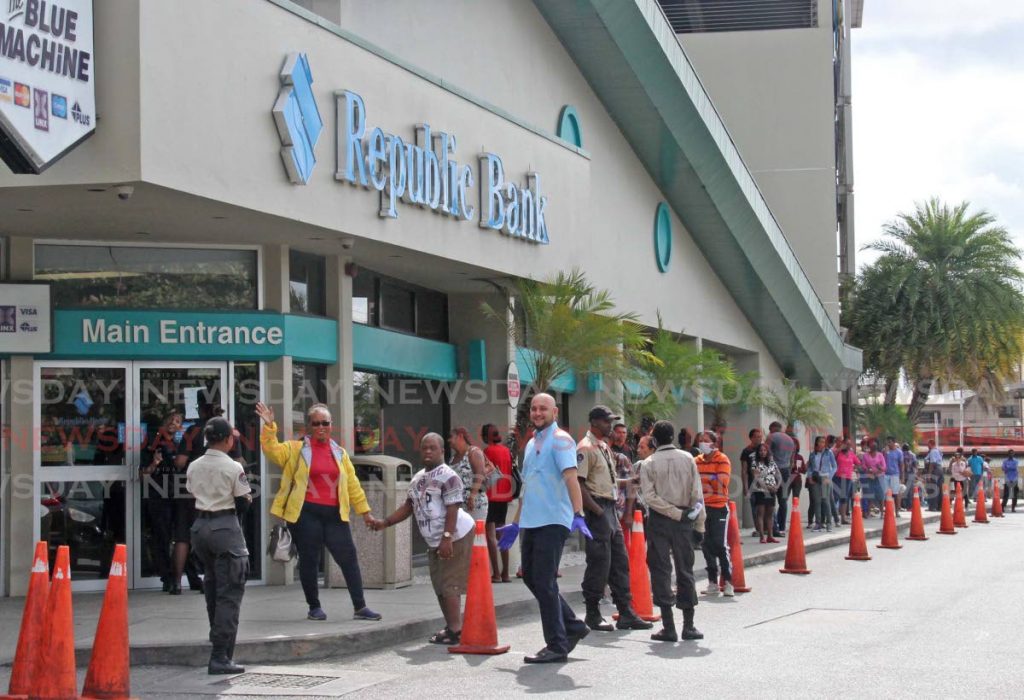S&P downgrades Republic, First Citizens

Global credit rating agency S&P has downgraded two of TT’s biggest commercial banks, Republic Bank Ltd and First Citizens, citing tumbling global hydrocarbon prices. This comes just a week after the New York-based firm downgraded TT from BBB to BBB-, one level away from junk-bond status, for the same reason – lower oil and gas price assumptions over the next several years.
In a report Wednesday, S&P said it was lowering its long-term and short-term issuer credit ratings on both Republic Bank and First Citizens BBB-/A-3 from BBB/A-2.
S&P also revised its trend on TT’s Banking Industry Country Risk Assessment (BICRA) economic risk to negative from stable because it expected a pressure surge on the banks’ asset quality and that business growth would slow as the coronavirus outbreak hits trade and lower oil prices contribute to a deeper economic contraction and increasing unemployment.
ECONOMY
COULD SHRINK
The trend on industry risk remains stable. “As a result, the negative outlook on both banks reflects our view for the next 12 to 24 months that a more prolonged economic contraction could harm domestic companies’ finances and cause unemployment to rise, which in turn would dent banks’ asset quality and operating performance in the medium term.”
The company said that although TT’s banks are not heavily exposed to oil companies, the local economy is heavily dependent on the energy sector. As a result, it expects lower hydrocarbon prices will cause TT’s economy to shrink 2.7 per cent for 2020, continuing the contraction in the country’s real GDP per capita over the past several years.
“We see increasing challenges to banks amid the recession and the coronavirus outbreak. It is currently uncertain when the spread of covid19 will cease because it is still at its early stage, and how deep the economic strain it will cause, because there are no empirical rules to estimate how social distancing could affect key economic variables.” S&P noted that the Government deems banking services as essential but still expects pressure on asset quality
“(A) public health crisis disrupts production and the plunge in consumption interrupts the payment chain, (so) some companies and individual borrowers will have difficulty with debt repayment. Therefore, we expect TT’s banking system to shift from a slight expansionary phase into the one of correction, but with a limited impact up to this point because we expect credit losses to remain manageable. Banks were able to contain the damage to asset quality in the past years of recession amid weak energy prices but relatively low unemployment and inflation rates.”
GOVT MEASURES
COULD HELP
S&P said it expects regulatory and governmental measures to mitigate risk to some extent. “In our view, the banks’ funding structure, which mainly consists of customer deposits, will partly help compensate for a restricted access to capital markets. We expect more initiatives to provide cash flow relief to clients in the short term, although the stabilisation of lenders’ balance sheet will depend on the length of the paralysis in business activity and its effect on economic growth.”
S&P also downgraded the National Gas Company from BBB/Stable to BBB-/Stable and Trinidad Generation Unlimited from BBB-/Stable to BB+/Stable.
A credit rating evaluates an entity’s ability to manage its debt and other financial obligations and is used by investors to determine risk.
According to S&P’s definition, its opinion focuses on the obligor’s (entity that issues a payment) capacity and willingness to meet its financial commitments as they come due.
A BBB rating (long-term) means an obligor has adequate capacity to meet its financial commitments but adverse economic conditions or changing circumstances are more likely to weaken its capacity to meet financial commitments. An A-3 reflects similar conditions but for the short-term. A BB rating means a company is in junk-bond (non-investment grade territory) and while is less vulnerable in the near-term, faces major uncertainty and exposure to adverse conditions could mean it is unable to meet its obligations.


Comments
"S&P downgrades Republic, First Citizens"